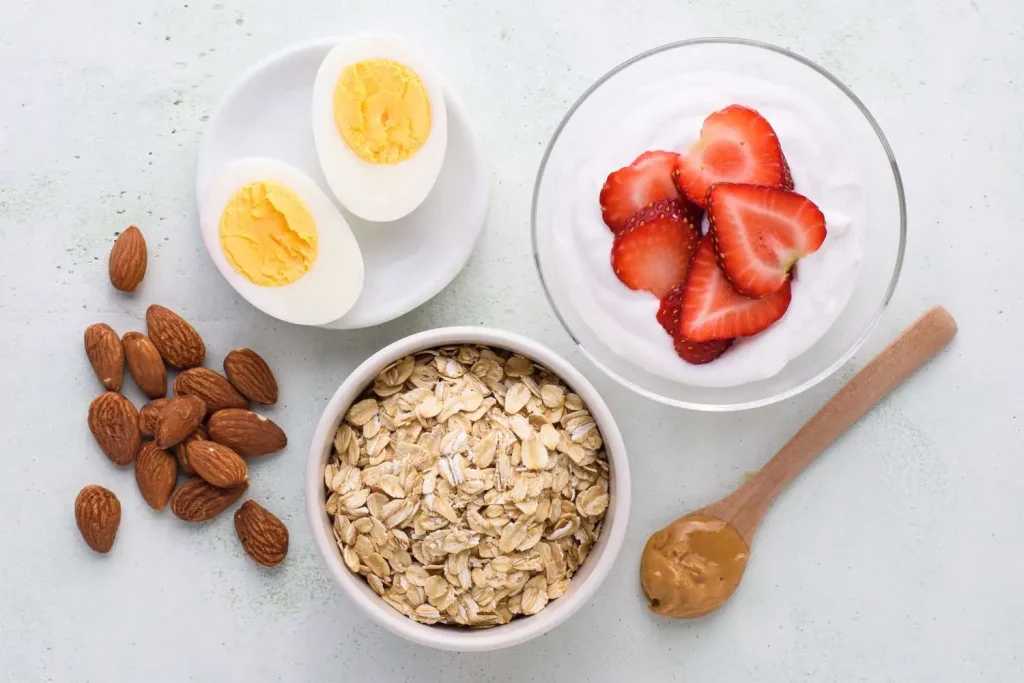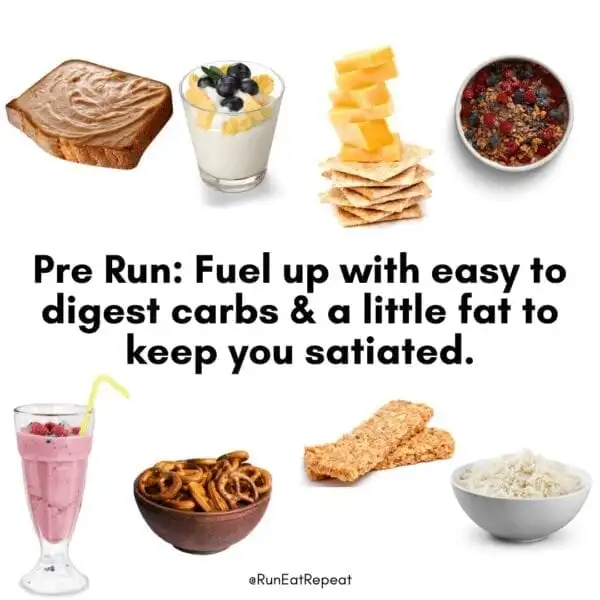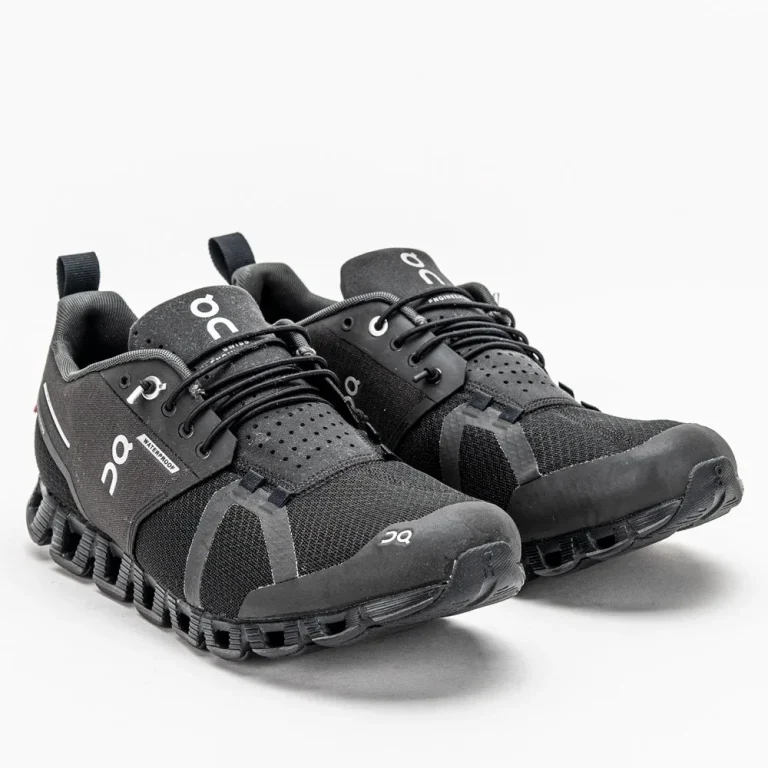What To Eat Before A Run? The Ultimate Runner’s Diet Guide
Should you eat before you run? This seemingly simple question can have a significant impact on your performance, energy levels, and overall running experience. Choosing the right pre-run fueling strategy can boost your energy reserves, prevent discomforts like cramps and nausea, and set you up for a successful run.
As a very general rule, some running experts recommend a light meal about one and a half to two hours before you start running, or a small snack 30 minutes to an hour before running.
The Fuel Gauge: Understanding Your Body’s Energy Reserves

Think of your body’s energy reserves like a fuel gauge in your car. During exercise, your body primarily relies on glycogen, a stored form of glucose, for energy.
Long runs, especially those exceeding 60–90 minutes, deplete glycogen stores more significantly, making pre-run fuel crucial for optimal performance.
However, the decision to eat before running isn’t always straightforward. Individual differences in metabolism, training experience, and goals can influence your needs.
For example, morning runs after an overnight fast may require a different approach compared to afternoon runs after several meals.
High-intensity workouts may benefit from a small pre-run snack to provide readily available energy.
To understand your individual needs and optimize your pre-run fueling strategy, it’s helpful to consult a registered dietitian or qualified sports nutritionist from the Academy of Nutrition and Dietetics.
These professionals can assess your situation and provide personalized guidance.
Do You Always Have to Eat Before a Run?
Especially if you’re a morning runner. It all boils down to what you like and what works for your body. Some runners, like the ones I’ve trained, love hitting the pavement fasted, especially for shorter runs. Others prefer to have a little fuel in the tank to avoid that hangry feeling mid-run.
The best way to figure out your pre-run routine is to experiment during your training runs. Find what keeps you feeling energized and ready to conquer those miles!
For those who skip breakfast before a quick 30-45 minute morning run, I recommend fueling up with a well-balanced dinner the night before.
Think protein, carbs, and healthy fats – all the good stuff! Then, you can grab a proper breakfast after your run to refuel for the rest of the day.pen_sparktunesharemore_vert
Choosing Your Pre-Run Fuel Wisely

Now that we understand the importance of pre-run fueling depending on the run duration and individual factors, let’s explore how to choose the right type and timing of food.
Timing is key:
- Long runs (1-2+ hours): Aim for a balanced meal 1-2 hours before your run to provide sustained energy release.
- Shorter runs (30–60 minutes): A small, easily digestible snack 30–60 minutes before your run can be sufficient.
- Morning runs: Consider a small, easily digestible snack like a banana with peanut butter or a piece of whole-wheat toast with honey if you typically run fast.
Food composition matters:
- Focus on carbohydrates: Choose easily digestible sources like fruits, whole grains, and starchy vegetables to provide readily available energy.
- Moderate protein: Include some protein sources like yogurt, eggs, or nuts for satiety and to support muscle recovery.
- Limit fat and fiber: Avoid fatty and high-fiber foods, as they can take longer to digest and cause discomfort during your run.
By understanding your body’s unique needs and following these general guidelines, you can develop an effective pre-run fueling strategy to power your runs and achieve your fitness goals.
Related To: Are Running Shoes Good For Everyday Use?
Related To: Are Running Shoes Good For Working Out?
Pre-Run Meal Ideas for Long Runs (1-2+ hours)

Long runs (exceeding 1-2 hours) require more sustained energy release. Here are some sample balanced meals to consider:
- Oatmeal with fruit and nuts: A classic choice offering complex carbohydrates for sustained energy, healthy fats, and protein from nuts for satiety.
- Whole-wheat toast with avocado and egg: This combination provides complex carbohydrates from toast, healthy fats from avocado, and protein from eggs, making it a well-rounded pre-run meal.
- Greek yogurt with berries and granola: Greek yogurt offers protein for satiety, while berries and granola add carbohydrates for energy. Choose granola with minimal added sugar for optimal benefits.
- Turkey sandwich on whole-wheat bread: Lean protein from turkey, complex carbohydrates from whole-wheat bread, and optional vegetables add fiber and essential nutrients.
- Vegetable omelet with whole-wheat toast: Eggs provide protein for muscle building and repair, while vegetables offer vitamins and minerals. Pair it with whole-wheat toast for additional carbohydrates.
Remember, these are just suggestions, and you should customize them based on your preferences and tolerance. It’s crucial to experiment and find what works best for your body before an important run.
Quick and Easy Pre-Run Snacks for Shorter Runs (30-60 minutes)
For shorter runs (30-60 minutes), a small, easily digestible snack is usually sufficient. Here are some simple and effective options:
- Banana with peanut butter: This classic combination provides readily available carbohydrates from the banana and healthy fats and protein from peanut butter for sustained energy.
- Energy bar: Choose bars with at least 10-15 grams of carbohydrates and moderate protein content. Look for bars with simple, recognizable ingredients to minimize digestive discomfort.
- Dried fruit and nuts: A handful of dried fruit and nuts offers a convenient mix of easily digestible carbohydrates from fruit and healthy fats and protein from nuts. Opt for unsweetened dried fruit to avoid excess sugar intake.
- Apple slices with cheese: This combination provides carbohydrates from the apple and protein and healthy fats from cheese, making it a satisfying and energizing pre-run snack.
- Yogurt with granola: Similar to the yogurt with berries and granola option for long runs, this smaller version offers a good balance of protein, carbohydrates, and healthy fats in a convenient format.
Remember, portion control is crucial for shorter runs. Opt for smaller portions of the above options to avoid feeling weighed down during your run.
Staying Hydrated: The Key to Optimal Performance

While food provides fuel for your run, hydration plays a crucial role in optimal performance and overall health. Regardless of your run duration, proper hydration is essential for:
- Supporting digestion and nutrient absorption: Adequate hydration helps your body effectively break down and absorb nutrients from your pre-run meal or snack. (Resource on Importance of Hydration for Digestion: link to a resource on the importance of hydration for digestion)
- Regulating body temperature: During exercise, your body temperature naturally rises. Proper hydration helps you sweat effectively, keeping your body cool and functioning optimally.
- Preventing dehydration headaches and fatigue: Dehydration can lead to headaches, fatigue, and decreased performance. Staying adequately hydrated helps you avoid these issues and run your best.
Here are some hydration tips:
- Drink water throughout the day, especially in the hours leading up to your run. Aim for at least 16-20 ounces of water in the 2-3 hours before your run.
- Consider sports drinks for longer runs (exceeding 1 hour). These drinks can help replenish electrolytes lost through sweat, especially during hot and humid conditions.
Remember, hydration needs can vary based on individual factors like climate and sweat rate. Adjust your fluid intake accordingly and pay attention to your thirst cues.
By fueling your body wisely with appropriate pre-run meals or snacks and staying adequately hydrated, you can set the stage for a successful and enjoyable run.
Conclusion
Whether or not to eat before a run isn’t a one-size-fits-all answer. Consider run duration, intensity, and your individual needs.
Experiment with different pre-run fueling strategies, focusing on easily digestible carbs and moderate protein. Remember, proper hydration is crucial regardless of your pre-run meal choices.
By choosing the right approach, you can fuel your runs effectively and achieve your fitness goals.







